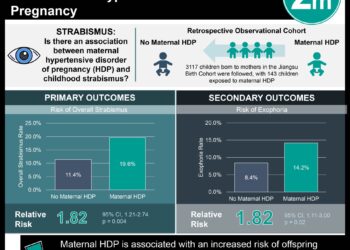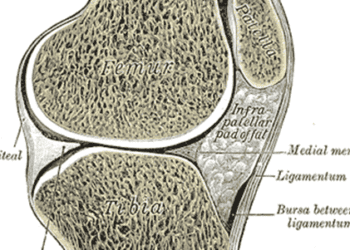Vitamin D deficiency linked to preeclampsia
1. Vitamin D deficiency was associated with increased odds of developing preeclampsia.
2. An inverse dose-response relationship was observed between vitamin D levels and risk for preeclampsia.
Evidence Rating Level: 3 (Average)
Study Rundown: Preeclampsia is a hypertensive disorder of pregnancy, diagnosed when women at ≥20 weeks gestation develop a blood pressure ≥140/90 mm Hg and either proteinuria of ≥0.3 g over 24 hours or a urine protein:creatinine ratio ≥0.3 or signs of end-organ dysfunction (elevated liver enzymes, elevated creatinine). Preeclampsia is associated with serious maternal morbidity and mortality including placental abruption, hepatic failure, pulmonary edema, eclampsia and disseminated intravascular coagulation leading to death. Risk factors for preeclampsia include personal or family history, nulliparity, multiple gestation pregnancy and preexisting medical conditions like chronic hypertension and diabetes. Prior work has suggested that aspirin and calcium supplementation may reduce the risk of preeclampsia in high-risk women. Given that adequate vitamin D levels are needed for proper absorption of calcium, researchers have posited that vitamin D status may also be associated with risk for preeclampsia. Previous studies have suggested that vitamin D deficiency, defined as serum 25(OH)D levels <30nmol/L, is associated with an increased risk for preeclampsia. The present work identifies an inverse dose-response relationship and identifies a threshold value of 50 nmol/L serum 25(OH)D over which the risk for preeclampsia is reduced.
Strengths include large study population and assessment of numerous potential confounders. Limitations include case-control design and small number of cases of preeclampsia despite a large sample size. Larger prospective studies using the most recent criteria for preeclampsia, which do not require the presence of proteinuria, are needed to confirm the findings observed here, after which randomized controlled trials exploring vitamin D supplementation for primary prevention might be explored.
Click to read the study in AJOG
Relevant Reading: Maternal vitamin D deficiency increases the risk of preeclampsia
In-Depth [case-control study]: This study evaluated the relationship between vitamin D status and risk for preeclampsia among women who did (n=169) and did not (n=1975) develop preeclampsia during a singleton pregnancy. Preeclampsia was defined as a blood pressure ≥140/90 mm Hg and a 24-hour urine protein ≥0.3g or a urine dipstick ≥2+. Case and control patients were matched for study site, gestational age, season and year. The primary exposure of interest was vitamin D status, and dose-response relationship between vitamin D and risk for preeclampsia was evaluated.
Vitamin D deficiency was associated with an increased likelihood of preeclampsia (OR 2.48, CI 1.51-4.08) compared Vitamin D proficiency, defined as 25(OH)D levels ≥50nmol/L. Women who developed preeclampsia had lower average serum 25(OH)D levels (p<0.001) and were more commonly vitamin D deficient (p<0.001) compared with healthy women. A dose-response relationship between 25(OH)D levels and risk for preeclampsia was observed up to 50 nmol/L.
More from this author: Cervical ripening with isosorbide mononitrate linked to increased side effects, Progesterone injections for short cervix do not reduce preterm birth, Unexplained infertility often overtreated, Twin-specific gestational diabetes screening guidelines needed, Increased nuchal translucency linked to progesterone therapy
Image: PD
©2014 2 Minute Medicine, Inc. All rights reserved. No works may be reproduced without expressed written consent from 2 Minute Medicine, Inc. No article should be construed as medical advice and is not intended as such by the authors, editors, staff or by 2 Minute Medicine, Inc.









